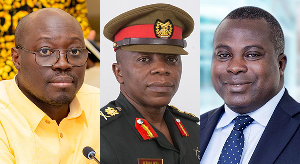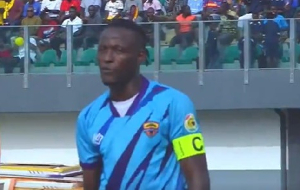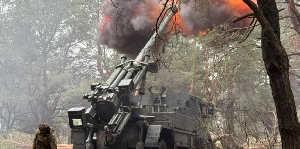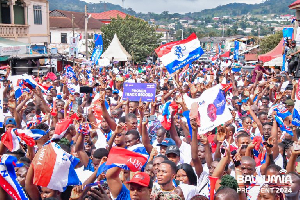INTRODUCTION
In mid July 2005, a group of Ghanaians in the USA and Canada came together to form the DIASPORA VOTE COMMITTEE (DVC). Soon they were joined by other Ghanaians living in Europe and Asia. The DVC does not represent any political party or ethnic group in Ghana. It is a non-self-perpetuating ad-hoc group that is growing daily and exists solely to reflect the views of the majority of Ghanaians living abroad on the current Representation Of the People (Amendment) Act 2005 (ROPAA). The DVC seeks to work cooperatively with the instruments of the Government of Ghana, local and international media to shed light on the debate and to ensure a fair, secure, and manageable voting by Ghanaians living abroad (Ghana?s Diaspora) in forthcoming national elections from their domiciles outside Ghana. In this, the DVC?s position is non-conditional. The DVC expects that the first registration exercise for Ghanaians abroad will be in connection with the 2008 national elections.The DVC hereby declares its position on several arguments that have so far been made in the public domain both for and against ROPAA. We note that the DVC intends to submit a more detailed statement to the Parliament of Ghana upon its resumption in October 2005.
Arguments in favour of ROPAA
1. Constitutional Right: By now most people are familiar with Article 42 of Ghana?s current Constitution: ?Every citizen of Ghana of eighteen years of age or above and of sound mind has the right to vote and is entitled to be registered as a voter for the purposes of public elections and referenda.? The DVC strongly supports the full implementation of this article and notes that this simply-stated sentence contains no restriction to voter registration and voting with respect to region or country of domicile. The DVC further notes that traveling or living outside Ghana does not deprive one of being a citizen of Ghana. Even where one may have voluntarily become a naturalized citizen of another country, Ghana has dual citizenship laws to offer remedies.2. Removal of PNDCL 284 as an impediment to implementation: The DVC acknowledges that the intent of the supreme law of the land, the Constitution (1992) as stated in article 42 is thwarted by PNDCL 284 (1992) that limits the registration of Ghanaians living abroad to only those who are employed in the service of the Republic, or the United Nations or other international organizations. Presumably the people in this extremely limited class have voted in all four national elections of Ghana since 1992. In very simple terms, the DVC states that ?what is good for the goose is good for the gander?. If a positive view is taken of this exception, it could be considered a pilot whose time is long overdue to be extended to the larger group of the citizens of Ghana living abroad and not necessarily working for the Republic but working nonetheless as ?ambassadors for Ghana?; good, bad or indifferent.
3. Ghana should join the international community: The DVC notes that several countries in the developing world entertain voting by their citizens living outside its own borders with two notable examples from West Africa- Mali and Senegal. Unless Ghana chooses to declare a policy of backward isolation, the idea of absentee balloting is upon us and we must cooperate to make it work for us. Thankfully, the Constitution of Ghana is in-step with this international phenomenon, at least, in intent and law. Upon the amendment of the restrictive aspects of PNDCL 284, Ghana will catch up to the rest of the progressive world in fact.
Arguments against ROPAA
For the sake of brevity and in anticipation of additional documents to be released by the DVC, brief responses are given to each argument.
1. Voting from abroad is a privilege of convenience not a right: The DVC respectfully refers to the Constitution and notes that there is no ?privilege of convenience? in the language.
2. Ghana does not have the money for Diaspora Vote: The DVC is painfully aware that Ghana is not flush with money and therefore must make choices. There is no money for a host of things; education and healthcare not excluded. However the right to vote is fundamental to democracy and the process of making choices for a nation. It has been noted that over 40% of Ghana?s election costs are paid by donors and the DVC conjectures that the same donors would be in support of funding the Diaspora vote. In addition, creative ways could be found to extract fees from the Diaspora to underwrite this cost without the appearance of ?purchased votes? Instead of being preoccupied with cost, we should be thinking about ways to extract more economic benefits from the Diaspora in an organized way that will far surpass the cost. When people vote, they have a stake and they begin to care more.
3. Diaspora Vote will be subject to massive fraud: We cannot predict massive daylight crime even before the first Diaspora voter has been registered. That will take some doing and Ghana would have found a new calling. A more useful exercise will be to openly discuss ways and means to avoid such feared outcome. There has been no record of massive fraud from overseas votes from any country that has implemented this exercise. We should march forward on the strength of a quote from President Franklin Roosevelt of US history: ?we have nothing to fear but fear itself.?
4 Ghanaians abroad pay no taxes to the common fund: The DVC respectfully notes that the proof of an individual?s payment of taxes to the common fund or any fund is not a requirement to vote in any election by any citizen of Ghana living in Ghana and or anywhere else for those lucky few in the PNDCL 284 limited category. We must discuss methods of funding Ghana?s elections, absentee ballots included but we must not be detracted by imposing burdens and conditions as a means of exercising a basic right of freedom and democracy. No, the entire world has moved away from that and Ghana will not restart it.
5 Remittances from Ghanaians abroad are personal and not to be used as arguments for their support of the country or in lieu of taxation: The growing size and economic effect of remittances from the Diaspora that is fast overtaking foreign exchange earnings from cocoa cannot be ignored or diminished regardless of description. In deed herein lies the case for Ghana to purposefully court its Diaspora for the nation?s internal economic growth as other countries are doing rather than kicking this very important multi-billion dollar asset as a tattered rag. Extending the vote and representation in Parliament are such courtship activities, to name a few.
6. Ghanaians abroad do not know or care enough to vote in Ghana?s parliamentary elections: This is a matter of debate, scale and relativity. The same charges can be leveled against Ghanaians at home, otherwise why would we need to spend millions of cedis on election campaigns in Ghana? If we are so scared of this then we can do a serialized implementation by starting with the Diaspora voting in the Presidential elections. Ghanaians abroad could be considered as one constituency to elect one Member of Parliament to represent their interest. We can assess progress and collectively decide the next steps. This by no means should be viewed as a point of concession by the DVC. It could be a point of compromise for implementation and management.
7. The number of Ghanaians abroad is not known: The DVC concedes this fact yet the lack of exactitude should not be put as a fault of the Diaspora. The very exercise of registration before voting will yield the positive effect of eventually getting a handle on the head count. May be this could be put as a request to the Donor community. The DVC is prepared to assist.
8. The number of Ghanaians abroad can overwhelm and decide the Presidential vote in Ghana: If that is the consequence then all of Ghana?s Political Parties will have an equal chance to make their case to Ghanaians abroad and a new level of accountability will be introduced into the country?s government.
9. The Ghana Missions cannot be involved in the overseas voting because they are appointed by the government: Can the Ghana Missions be trusted to represent the country at any time in anything else? If not, we have a more serious problem that has nothing to do with Diaspora voting. Why does PNDL 284 give these same individuals the vote in Ghana?s elections if they cannot even be trusted to carry on their assignments with integrity? We impugn our national and international integrity with such arguments of mistrust purely because governments by necessity change hands. Voting by the Diaspora is an action of permanence and must be viewed that way otherwise the forces of whimsical fancy will cripple us as a nation.
10. How can we know who is Ghanaian to vote abroad? How can we know who is Ghanaian to vote in Ghana? The nation must address its questions of identification that again have nothing to do with the Diaspora vote even if that makes the need more pronounced. We can learn from other countries that use birth certificates, passports, national identification, dual citizenship registration, etc.
11. Even if the Diaspora must vote, why do it now? To quote both Robert Kennedy and Dr Martin Luther King, ?If not now, when? If not us, who?? Postponement for the purpose of waiting for a convenient change in the nation?s Party leadership does not make the need for universal adult suffrage for Ghanaians everywhere go away. It merely changes the occupants of the chairs in the debating room while the country stagnates.
12. The NPP government should have the Electoral Commission explain everything to Ghanaians before ROPAA is introduced to Parliament: This is putting the cart before the horse. There is a fundamental hindrance to the Electoral Commission carrying out its work as enunciated above. It is a legal hindrance and only Parliament can remove it. After that the Electoral Commission can advise Parliament of its proposed solutions. That is where the talking to the Diaspora and others begins. Otherwise on what authority and on what subject can the Electoral Commission or the current government engage people in discussions?
BACKWARD NEVER, FORWARD EVER
WE CAN AND SHALL OVERCOME.
Respectfully submitted by the DIASPORA VOTE COMMITTEE. All interested parties wishing to join this historical movement should contact Mr. Kofi A. Boateng of the Africa-America Institute by e-mail at kboateng@aaionline.org.

Views expressed by the author(s) do not necessarily reflect those of GhanaHomePage.

Views expressed by the author(s) do not necessarily reflect those of GhanaHomePage.














